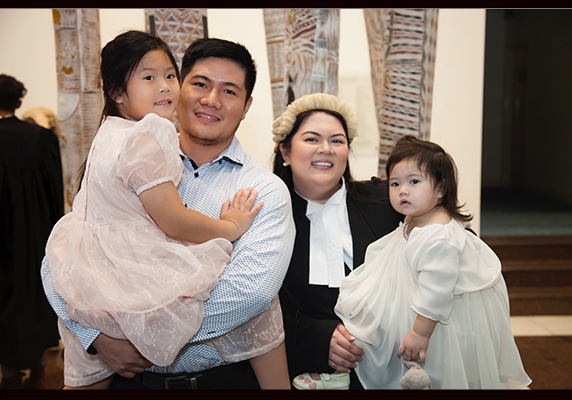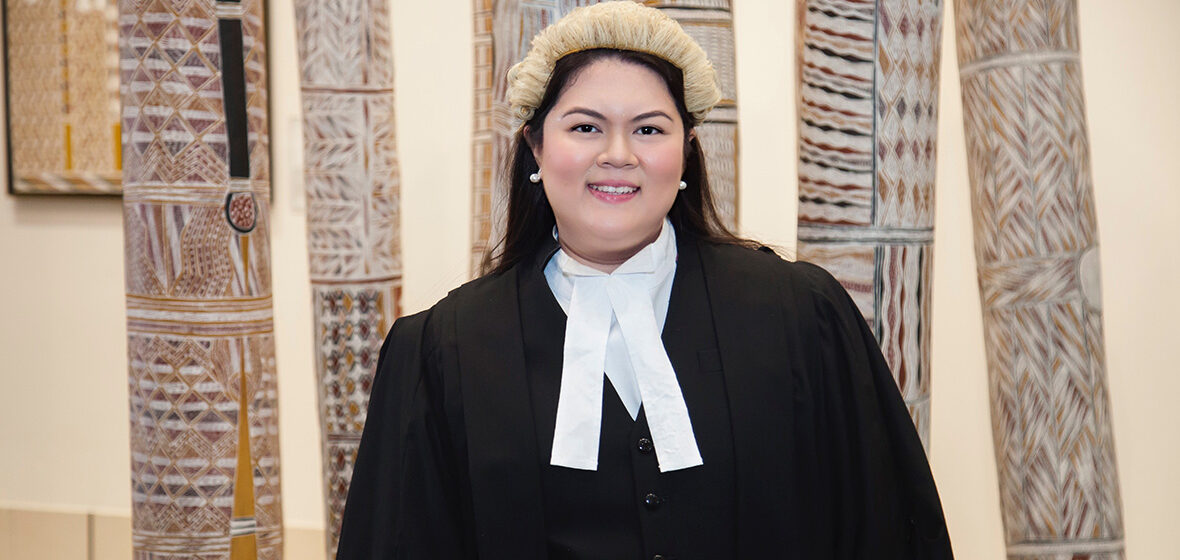For Zarah Denese Tenorio-Ramoso, becoming a lawyer has been a journey spanning continents, career changes and childrearing. She shares how she balanced migration, work, study and parenting to achieve her childhood dream.
In March this year, Tenorio-Ramoso was officially admitted as a Northern Territory Supreme Court lawyer. This followed her graduation from a Bachelor of Laws degree at Charles Darwin University with the highest honours.
Tenorio-Ramoso admits this was a hugely emotional experience – the accumulation of many years of studying, navigating the migration system, juggling multiple full-time jobs and doing her final exams while also breastfeeding her second daughter.
Tenorio-Ramoso is currently working full time as an Administrative Policy and Complaints Officer with the office of the Information Commissioner and Ombudsman NT. Simultaneously, she is volunteering for Top End Women’s Legal Service on its after-hours helpline.
What the highly accomplished and qualified Filipino-born, Darwin-based mother is not doing is working as a practising lawyer.
“I can’t commit myself to practising law right now because despite all my life experience I would start from the bottom, and financially that doesn’t work for my family right now. When you start as a lawyer, you go into the office before 7am and don’t leave until after 7pm for the first three years. My friends who are practising don’t have a life, and … I’ve given up so much of my time already and taken time away from my kids while studying that now I want [time] to make memories with them.”
It is lamentable that many driven, qualified lawyers who come to the industry later in life, as Tenorio-Ramoso did, cannot make a living from their work or accommodate the long, demanding workdays required of recent graduates.
It is lamentable that many driven, qualified lawyers who come to the industry later in life cannot make a living from their work or accommodate the long, demanding workdays required of recent graduates.
Born and raised in Batangas in the Philippines, Tenorio-Ramoso moved to Manila at the age of 17, intending to study law.
“In the Philippines, law is postgraduate study. First I did a Bachelor of Arts in Legal Management for four years, finishing in April 2013.”
Her parents had moved to Australia in 2012 with her two younger siblings, and when Tenorio-Ramoso graduated from her Arts degree, they insisted she move to Darwin to join them. She resisted, arguing that she had offers from law schools in the Philippines.
Tenorio-Ramoso’s parents won, and she moved to Darwin to live with her family when she was 21.
“My dad is a carpenter, so he moved here through the skilled migration scheme. Technically, I was his dependant, as were my siblings. Because I’m over 18, the conditions at the time for a dependant were that I had to study full-time.”
She had wanted to study law since the age of 10, but her experience had been of a very demanding method of studying law in the Philippines, and she assumed this would be the same in Australia.
“In the Philippines the study of law is very different – you have to memorise everything, it’s very legislation-based, we have a lot of codes and statutes, whereas [as she discovered later], in Australia it’s about trying to understand the principles rather than trying to memorise everything.”
Instead of commencing studies in law, therefore, Tenorio-Ramoso worked to support herself and travelled back to Manila to visit her extended family and her now husband. Soon after they married in the Philippines in 2015, she returned to Darwin, becoming a permanent citizen that year, and began working in the customer service department of Charles Darwin University, Student Central. It was there she realised there were flexible options around studying, and scholarships available to her. A year after her first daughter was born, she enrolled in a law degree and took a role as a paralegal for Menzies School of Health Research.
She remained working full-time at Menzies until last year to pay for day care.
“My husband was working two jobs. Menzies is a very accommodating employer, and they granted me study leave, so I had four hours per week to study, which I could combine with my lunch breaks. Because the law school is literally the building next door to the Menzies School, I could go and attend my lectures. I could have done this fully online but I retain information a lot better when I’m in the classroom taking notes and talking to the lecturer. I could work longer days to make up hours at Menzies. I’m so grateful to Menzies for that.”
Tenorio-Ramoso had her second child in 2020, and while on maternity leave from Menzies, she applied for her current role.
“I had my final law exams four days after I had my daughter. If you ask for it, there’s some concessions that they give you. I needed to express milk and feed her during the exam, so they gave me extra time, which is a big thing when answering exam questions. Not a lot of people would know, and as a prospective student, I wouldn’t have known that [concession existed].”

Before studying, Tenorio-Ramoso was sure she would be a criminal lawyer. “Because I love the adrenalin,” she laughs.
“It’s exciting, there’s lot of arguments, it’s interesting. When I studied it in second semester, I topped the subject because I was studying really hard and enjoying it. I was also interested in migration law because that’s how I came to Australia. When I finished, I wasn’t sure what area of law I wanted to work in, but when I completed my Graduate Diploma in Legal Practice I realised that I really love administrative law, which includes migration law.”
Tenorio-Ramoso and her family will move to Bali next year, where she will work for a private law practice that is allowing her flexible conditions.
“Some people see children as a hindrance to being a lawyer, but to me, it is fuel. I want them to grow up seeing that if you put your heart and mind into it, you can achieve it. I don’t want my children to grow up thinking that their mum didn’t become a lawyer because of them.”




